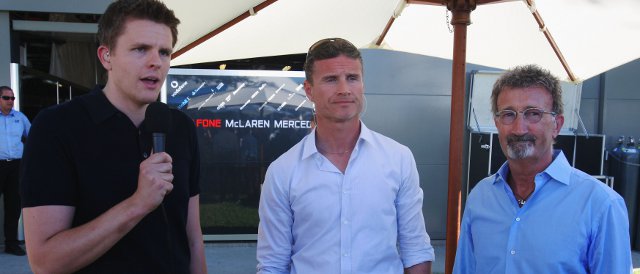
For the last three seasons it has been the BBC team of (from left) Jake Humphrey, David Coulthard and Eddie Jordan who have been the first choice for UK F1 coverage. This year, however, things could be different - Photo Credit: Mark Thompson/Getty Images
Those of you with exceptionally good memories may vaguely recall an announcement at the end of July 2011, just before last season’s Hungarian Grand Prix. If it has slipped your mind, that is perfectly understandable – there was little or no coverage of this anouncement in the media, nobody had any particularly strong opinions on it, and the details have largely been forgotten.
Anyway, in an attempt to jog your memory, this is what happened: the BBC, who were midway through the third year of a five year deal to show Formula 1 in the UK, announced that, from 2012, they would be sharing the coverage with Sky Sports.
This came about after the BBC were required to cut various budgets, including the amount they pay on sports rights. However, they could not just ditch F1 midway through their deal with Bernie Ecclestone, at least not without paying a considerable penalty.
Luckily, Sky were on hand with a lot of money to take some of the rights off the BBC’s hands. In this deal, Sky will show all 20 of the races in 2012, whilst the BBC will show ten races live and extended highlights of the rest.
Essentially, everybody was a winner in this deal: the BBC offloaded some expensive rights, Jake Humphrey still gets to travel around the world criticising Eddie Jordan‘s shirts, Sky have finally got F1 to add to their expansive sports portfolio, the teams get more money, and Ecclestone had once again pulled of a big deal, further adding to his reputation as an excellent operator.
Sounds good! However, not quite everybody was a winner…
If fans wish to watch every race live this season, they will need to pay a subscription to Sky. Fortunately, all UK fans accepted this situation when the announcement was made, and nobody complained at all. Not one individual blamed the BBC, or Sky, or Rupert Murdoch, or Ecclestone, and there wasn’t a single claim made by anyone that they would boycott F1 altogether from 2012 onwards.
Obviously, this deal means that there are even more ways to follow F1 this season, and choices to be made about where to get your fortnightly fix. In this useful guide, we round up six and give the advantages and disadvantages of each:
Sky Television
What you need: A subscription to Sky that includes either the HD (High Definition) package or Sky Sports 1 & 2 or a Virgin Media subscription with the correct channels. SkyGo customers will also be able to stream F1 action via skygo.com, tablets and mobile devices.
Advantages: Every race live and in HD on a brand new channel dedicated to Formula 1. Races will not be interrupted by adverts, and Sky have poached the best of the BBC talent.
Disadvantages: You will have to pay money for it. Sky television with HD is £30.25 a month, Sky TV with the required sports package is £40 per month + £10.25 for HD. Oh, and you’ll still need a TV licence – the wages of the BBC F1 team need paying too.
Comments: Sky are determined to do this properly, and they will be throwing a lot of money at this coverage. Martin Brundle and Ted Kravitz have been signed from the BBC television team to be part of the commentary team and pit-lane reporter respectively. David Croft from BBC Radio 5 Live becomes lead commentator and Anthony Davidson and Natalie Pinkham also make the transition from radio to television. Davidson will be in the commentary box with Croft for practice sessions and Pinkham will join Kravitz in the pitlane. Damon Hill has been announced as a pundit for ten of the races next season. There will also be live coverage of the GP2 and GP3 races, historic race re-runs and a weekly F1 magazine show presented by Kravitz and Georgie Thompson. Simon Lazenby presents the coverage.
BBC Television
What you need: A TV licence (or watch the races on iPlayer after they have happened and you don’t even need that).
Advantages: No monthly subscription charges.
Disadvantages: Only ten races will be shown live and, for the other ten, viewers will have to wait until a few hours after the end of the race to see the extended highlights. The award-winning on-air team that has delivered the coverage over the last three years has been broken up, and Brundle and Kravitz will be missed.
Comments: The BBC have said that the coverage will be better than ever this season. Clearly not everybody can (or will want to) switch to Sky, and the BBC will be keen to attract those who have paid for Sky back the ten live races. Jake Humphrey remains as anchor with David Coulthard and Eddie Jordan staying on as pundits and Lee McKenzie will still be driver interviewer. Ben Edwards join the team as lead commentator alongside Coulthard and Gary Anderson joins as to give some much needed technical insight to the coverage. The races to be shown live are China, Spain (Barcelona), Monaco, Europe (Valencia), Britain, Belgium, Singapore, Korea, Abu Dhabi, and Brazil. This means that they will not be able great races like Canada, Italy and Japan live, or the inaugural US Grand Prix from Austin, Texas.
Radio (BBC Radio 5 Live/5 Live Sports Extra)
What you need: A radio (obviously). An old-fashioned analogue radio with MW will be sufficient to get most of the races live, although a digital radio will be needed for practice sessions and qualifying.
Advantages: All races, and most qualifying and practice sessions live (sometimes coverage of other sports like cricket and tennis means that these are not aired, but commentary is normally available online).
Disadvantages: No pictures (unless listening to commentary via the red button, which counts as BBC television – see above). The all-new on-air team have a huge challenge on their hands to live up to the excellent presentation of the previous incumbants.
Comments: With Croft, Davidson and Pinkham all heading off to Sky, a completely new team will present the radio coverage this season. James Allen, he of the ITV television coverage and successor to Murray Walker, will take to the airwaves as lead commentator, and Jennie Gow will take over Pinkham’s pit lane role.
What you need: Some sort of computer-type device, smartphone or tablet thing… and a Twitter account.
Advantages: You can get up-to-date qualifying/race coverage from a variety of sources, including news from official team accounts, media people at the track, and armchair fans who have paid for a Sky subscription. Some of the comments may well be much more humourous than the stuff coming out of the television or radio, and probably be a lot more tounge-in-cheek or politically incorrect.
Disadvantages: Some of the information you get will be complete rubbish, you might miss out on the full story and, depending on how many people you are following, you may get a lot of tweets saying exactly the same thing.
Comments: The advent of Twitter has been great for keeping up with F1 news between races, and it also acts as a useful companion will watching races on TV or at the track. However, relying on it as your sole source of information about a race might be a step too far.
Newspapers, Magazines and Websites
What you need: An ability to read.
Advantges: Some newpapers, magazine and websites produce excellent reports on F1 race weekends, giving you all the important information and analysis, without having to sit through a two hour race yourself.
Disadvantages: No matter how good the descriptions are, there is no sense of the general speed and sound of F1 and it is generally quite difficult to get a sense of how the story of the race unfolded by just reading reports.
Comments: Top quality F1 journalism is always worth reading, even if you have sat through every practice session, qualifying and the race. It gives you more perspectives on the weekend you have just witnessed. However, having to wait until Monday morning (or much later in the case on weekly/monthly magazines) to get your F1 fix is not going to work for most fans, so this method of following F1 is best used in conjunction with some television.
Watch Every Race From the Grandstands
What You Need: A small personal fortune, an awful lot of annual leave from work, and a high tolerance of jet lag.
Advantages: This is the ideal way to follow Formula 1. For UK-based fans it involves 19 foreign holidays and a trip to Northamptonshire each year. You get to travel the world, and get very close to your favourite sport.
Disadvantages: If you think a Sky subscription is a bit pricey, this option is not for you – the cost of this approach will run to tens of thousands of pounds. And your personal carbon footprint will be huge.
Comments: Travelling with the F1 circus for an entire season is almost certainly way beyond the means of virtually everybody who will be reading this. However, every F1 fan should attend at least one race at some point. You will be amazed by the speed and the sound of the F1 cars, something for which the television cannot prepare you. Make an effort, either this season or next, to head to Silverstone in July (it doesn’t always rain), or perhaps nip over the Channel to the legendary Spa-Francorchamps circuit in late August for the Belgian Grand Prix (where it almost certainly will rain at some point during the weekend).


